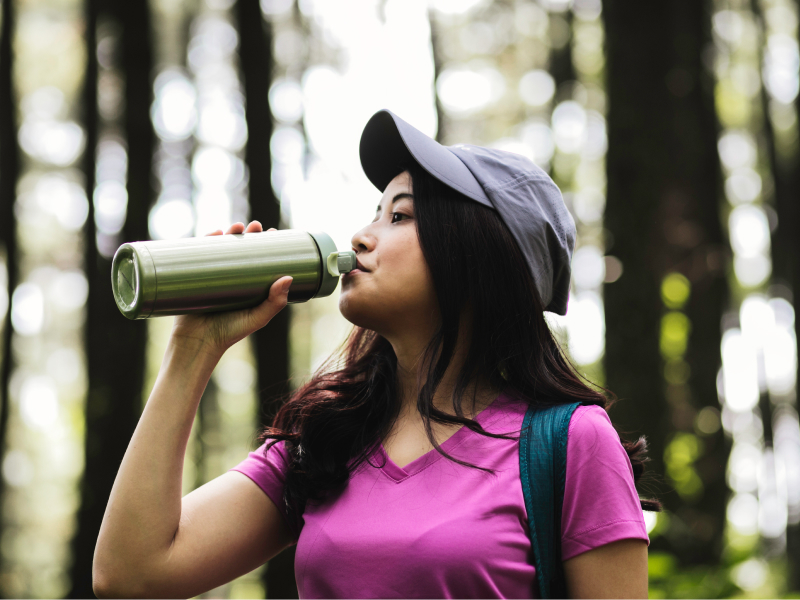To keep healthy this summer while having fun in the sun, we offer the following lifestyle tips. By incorporating these ideas into this active season, you can experience the many joys our region’s outdoors offers, while caring for yourself, your body, and your mind.
1. Get Outside and Enjoy the Outdoors
Summer in Portland is full of outdoor events and festivals. Plan to meet up with friends at a music festival, take a day trip to a waterfall hike, a bike ride around town, or maybe a road trip to the Oregon Country Fair. When you choose to spend more time outside, Dr. Wood explains that you’re not only giving yourself a chance to enjoy the scenery, you’re creating an opportunity to connect with nature, expose your body to much needed Vitamin D, and to make fun memories all at once!

Whether going on hikes, gardening in your yard, or just eating meals outdoors, Dr. Wood says “We encourage our patients to spend as much time as possible outside in the summer. It’s good for your health and a good move for your general well-being. Sunlight boosts our body’s vitamin D, increases our serotonin, and creates a healthy positive mood.”
We also caution that when outside, be sure to take “shade breaks” to regulate your exposure to direct sun and reduce how much fluid you lose through perspiration.
2. Stay Hydrated to Protect Your Body
Whether you spend your time indoors or out, aim for drinking at least eight glasses of water daily. With the amplified heat of the summer months, you’ll want to ensure you keep your body hydrated. If you’re very active or spending a lot of time in the sun, you’ll want to increase your water intake.
Dr. Wood advises drinking enough during the day, so your pee is a pale clear color. Drink more when there’s a higher risk of dehydrating. For example, if you’re sweating due to hot weather or exercise, or if you have diarrhea. Click to view a video about how to reduce the risk of dehydration.

In addition to helping protect from dehydration, which can lead to heat exhaustion, Dr. Dhai Barr explains in a recent blog: “Drinking plenty of water during the day helps to maintain your skin’s moisture balance and flush out toxins for a healthy, glowing complexion.”
If you’re going to be outside for an extended period, take along a sports drink to replenish your electrolytes. And if you’re a NW Regen patient and either being treated for chronic illnesses or training this summer for sports and concerned about your hydration, be sure to contact our office and ask us about our new Hydration IV treatments.
3. Know the Signs of Heat Exhaustion & When to Get Help
Beyond staying hydrated, be sure to take periodic shade breaks when you’re out in the sun for longer than an hour. Spending too much time in the heat can lead to dehydration, heat exhaustion, or even heatstroke. Know these signs and symptoms and seek medical help when necessary.1
Both heat stroke and heat exhaustion are caused by your body’s inability to cool itself.
Heat Exhaustion: Signs of heat exhaustion include heavy sweating, dizziness, and lightheadedness. If untreated, this state can lead to heatstroke, which is a medical emergency.
If you experience symptoms of heat exhaustion, try to find a cooler, shady location, remove a layer of clothing, or move to an air-conditioned space. Stop doing any strenuous activities. Drink water or a sports drink with electrolytes, which your body loses through excessive sweating.
Heat Stroke: Heat stroke is a medical emergency. Symptoms include a high body temperature, confusion, and unconsciousness. Upon signs of heatstroke, call 911 immediately. If you’ve become nauseated or vomit, seek help from a medical doctor right away.
If you’re experiencing any symptoms of a heat-related illness, a temperature above 100°F may indicate heat exhaustion while a temperature above 104°F is a sign of heat stroke.
4. Wear Sunscreen & Protective Clothing
The number one summer accessory is sunscreen. Apply a broad-spectrum sunscreen with an SPF of at least 30 to the face and any exposed skin daily to shield from damage. Dr. Barr reminds all of us to: “Remember to reapply every two hours, or more frequently if you are swimming or sweating.

She also recommends protective clothing to provide additional protection against harmful UV rays. The three key summer wardrobe essentials? UV sunglasses, wide-brimmed hats, and light-weight long sleeves. Click here to learn more about how long-sleeves keep you cool in summer.
5. Visit Local Farmers’ Markets Once a Week All Summer Long
Dr. Wood is a big fan of local and in-season eating. He says, “Adding fresh fruits and vegetables to your diet helps support your health and boost your immune system.” We encourage you to visit Portland’s local farmers’ markets for farm-fresh produce and some in-season items listed below.

When you shop at local markets, you will be supporting local farmers while meeting new neighbors and exploring new neighborhoods.
Did you know?
Often, produce from the local farmers’ markets is less expensive, fresher, and more nutrient-rich than grocery store fruit and vegies, because it doesn’t need to be transported as far and can stay on the vine or branches longer.
Also, fresh vegies and fruit are great sources of antioxidants like vitamin C, vitamin E, beta-carotene, and other carotenoids that pack a big health punch, acting as defenders of your DNA and reducing your risk of disease.Beyond staying hydrated, be sure to take periodic shade breaks when you’re out in the sun for longer than an hour. Spending too much time in the heat can lead to dehydration, heat exhaustion, or even heatstroke. Know these signs and symptoms and seek medical help when necessary.2
These options are great choices to try for nutrient-rich and moisture-rich summertime foods:
- Watermelon
- Corn on the cob
- Cucumbers
- Tomatoes
- Berries
- Peaches
- Plums
- Cherries
- Nectarines
- Figs
6. Stay Active. Move Your Body. Enjoy Getting Physical!
The sun’s up early and out late this summer. That gives you ample time to add some activity to your schedule. Get out when it’s cool for a neighborhood walk, take a swim in a local watering hole, schedule some active date nights, or hit the pickleball court, your choice. Summer is a great time to put your fitness first, whether you’re playing games, walking, swimming, or biking about town.

Note: People with chronic health conditions or those who are at risk for them may need to modify their exercise plans during the summer months. NW Regen recommends you make time to talk with a doctor before any new exercise.
How much exercise do you need? Here are some guidelines from the US Dept. of Health3:
- Every week, adults are advised to do at least 2.5 hours of moderate-intensity aerobic activity (i.e., brisk walking) + 75 minutes of vigorous-intensity aerobic activity (i.e., jogging or running).
- Kids and teens should do 60 minutes (1 hour) or more of physical activity every day.
- In addition to aerobic activity, it’s advised adults also do muscle-strengthening activities, like lifting weights or doing push-ups and sit-ups, at least 2 days a week.
- And it’s recommended kids and teens do muscle- and bone-strengthening activities, like running and playing tag, at least 3 days a week.
Whatever you do this summer, we wish you good health. Stay active, hydrated, and protected from the sun as you enjoy your people! By tuning into the season, tasting its bounty, and exploring local offerings, we grow closer to nature and closer to the natural rhythms of the seasons. Any steps toward living in tune with the Earth will bring you added emotional and neurological benefits, as we balance our working and thinking lives with active, embodied, and meditative activities. Enjoy!
Footnotes
NW Regen
We offer regenerative and interventional medicine – tailored to empower you with a more vibrant, active lifestyle.


